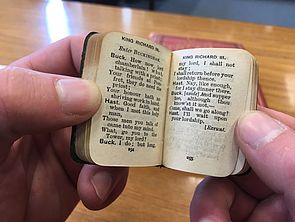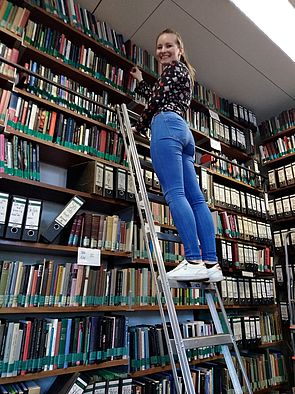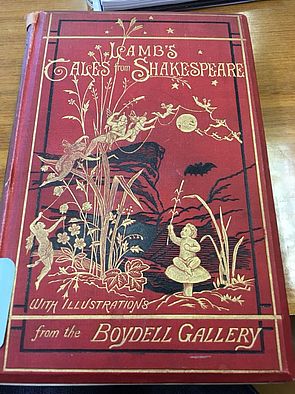Not all the world is a digital stage - The Shakespeare Library in Munich
|
08. Mai 2018
|
Führung,
Führung | Bibliothek



Munich. A room, the walls lined with shelves. Some desks.
Dr. Boecker at her post. Enter to her a group of young people, accompanied by a teacher.
Dr. Boecker: Halt! Who goes there?
Visitors: 'Tis us, the ones who strife to be wardens of tomes and guides to seekers of knowledge.
Dr. Boecker: Welcome! Please, take seats.
The visitors sit down at the desks.
Dr. Boecker: Hear now the history of the Shakespeare Research Library!
Founded in 1964 by Wolfgang Clemen, the Munich Shakespeare Library houses the most profound collection of Shakespeariana outside of Britain. Located in the building of the faculty for Language- and Literature it is tightly connected to the department of English and American Studies, specifically the division of English Philology. The Head of the department is at the same time head of the library, but the administrative tasks are mostly taken on by Dr. Bettina Boecker, vice head of the library who also teaches at the university, and her team of student assistants. As such, the Shakespare Library is an Research OPL with helpers.
Clemen, born in Bonn 1909, was chair of English at the LMU from 1946 until 1976 and had a huge influence on the rebuilding of the department. His many connections to colleagues in Britain and the US were invaluable to obtain books for the collection of the Shakespeare Library in a time, when Germany was not very popular in foreign countries. Clemen's friends abroad not only helped him get books for the library, but also articles, essays, translations. These were the foundation of the library collection.
Dr. Boecker knows things (unlike Jon Snow). As lecturer and scientist of English Literature, she is able to render the ressources in her house accessible in a detailled and thorough way, classifying them after a content-based scheme and cross referencing them. This is very valuable for interested students, scientists and Dr. Boecker’s fellow Shakespeareans.
To answer the question of ‘to buy or not to buy?’ is also in Dr. Boecker’s responsibility as well as the task of keeping track of relevant new publications in the field of Shakespearian Studies.
But in the world of Shakespeare Science, not all the world is a digital stage yet. Essays are still printed out and put into folders, which cannot be found via the OPAC of the LMU, unlike the books. Also, the Shakespeare Library is one of the last havens of the good ol' card catalogue, which fills several wooden boxes and is still consulted regularly. It was saved from digital death by the student assistants, who found the scientific editorial information too important for the researchers.
This library is a kind of sanctuary with pilgrims arriving from all over the world, including anglophone countries. Though the library is small, its collection is the biggest of its kind in Europe. If you are looking for a German book on Shakespeare, you should find it here. Every German book on Shakespeare. Or Shakespeare translations in different languages, including some obscure Indian dialect. Or, if you are working on Bavarian adaptations of Shakespearian plays, here is the place to find unpublished scripts…
But lo, there hidden treasure dwells! In a showcase in the corner are some objects on display to catch even the interest of adolescent students who are dragged into these sacred halls by enthusiastic English teachers. A 16th century edition of Holinshed’s Chronicles of Scotland (a work Shakespeare used for writing Macbeth) is no everyday sight for digital natives. And the sheer beauty of a Japanese edition of Shakespeare’s Sonnets gets to your heart.
The Shakespeare Library may not be a protagonist on the digital stage, no. It feels rather like being behind the scenes of the brave new world. But truly this is where the real things are happening before they are put on stage. Come in, find your books and take a seat. The rest is silence.

Keine Kommentare mehr möglich!
0 Kommentar(e)